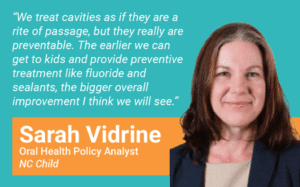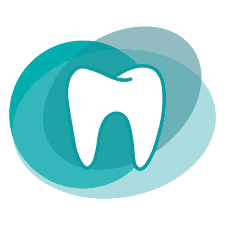Editor’s Note: We are kicking off Children’s Dental Health Month with great news: A huge barrier to dental care is out of the way for thousands of NC children!
This change happened thanks to comments from hundreds of North Carolinians, including many members of the Child Advocacy Network. This could be life-changing for so many kids in our state. Read about the potential impact of the rule change in this guest blog from our friends at the NC Oral Health Collaborative.
On Thursday, January 16, 2020, the North Carolina Rules Review Commission gave its final approval of a rule change to ease restrictions on dental hygienists, increasing access to oral health care for children in high-need settings.
The NC Oral Health Collaborative sat down with Sarah Vidrine, the policy analyst for NC Child, to discuss this rule change and how it will impact children in North Carolina.

What Exactly Does This Rule Change Do?
“It removes barriers to oral health care for kids in school-based settings, and it will ease the burden on the provider community,” said Vidrine. “For dentists and hygienists, it eliminates unnecessary barriers to allow providers to do the work they are trained to do.”
The change to Rule 16W allows hygienists located in Dental Provider Shortage Areas (HPSAs) to provide preventive care based on a written standing order from the supervising dentist rather than a dentist’s in-person exam. By decreasing the administrative burden of a prior exam, more children will have access to preventive dental care.
With 74 percent of North Carolina counties designated as HPSAs, this change opens doors for children across the state and is an important first step toward more equitable access to preventive care.
How Will This Help Children Access Oral Health Care?
Vidrine said that one of the exciting impacts of this rule change will be the increased ability for dental hygienists to go into schools to provide preventive treatment.
“School-based programs are promising because they let us meet kids where they are,” Vidrine said. “It’s a more efficient and cost-effective way to get kids dental care.”
“We treat cavities as if they are a rite of passage, but they really are preventable. The earlier we can get to kids and provide preventive treatment like fluoride and sealants, the bigger overall improvement I think we will see,” she said.
What Makes School-Based Care Different?
In schools, versus traditional care in a dental office, all kids have the opportunity to directly access care.
“School-based clinics reach kids instead of relying on parents to be able to take time off work, get their child out of school, and get them to a dentist,” said Vidrine. “Especially for families on Medicaid and families without insurance, it can be very difficult to get care, develop a treatment plan, and follow through. In school-based clinics, a lot of those barriers are removed.”
Why Is It Important That Dental Hygienists in Schools Be Able to Provide This Treatment in High Need Settings?
It really boils down to the numbers, according to Vidrine.
“In North Carolina we have both a shortage and a maldistribution of dentists. So, we have too few dentists to meet the need of the population we have, and most of these dentists are practicing in a fifth of the state,” said Vidrine. “Even with great programs through UNC and ECU that are very targeted at getting better access to rural communities, they are not going to graduate enough dentists to meet the need. Plus, we have a rapidly retiring population of currently practicing dentists.”
With the growing shortage of dentists, hygienists are necessary to fill the gaps in high-need settings.
“There are more dental hygiene programs than dental schools in the state, and they stay full and are very competitive,” Vidrine said. “We don’t have a similar shortage of hygienists in North Carolina.”
Along with waiving the prior exam in high-need areas, the rule change also allows dentists to supervise more than two dental hygienists who are practicing in high-need settings and have been duly trained as public health hygienists. Given the surplus of dental hygienists in the state, there is potential to access a much larger workforce focused on early preventive interventions.
“A dental hygienist’s role is to serve as the prevention arm,” said Vidrine. “Dentists spend a lot more time in school on treatment and interventions and less time on prevention, which is really the function of hygienists.”
The Takeaway: This Change Has Been a Long Time Coming, and We Will Keep the Momentum Moving Forward
“Advocates have pushed for similar rule changes for over 20 years, dating back to a 1999 North Carolina Institute of Medicine task force report on dental care access,” said Vidrine. “That happened before my time in oral health, but NC Child has been involved since 2015 when we started to look at policy options in collaboration with NCOHC.”
Years of effort, with the involvement of many different groups, has finally paid off. The final rule change was co-sponsored by NCOHC and the North Carolina Dental Society, the two organization’s first partnership of this magnitude.
Looking forward, the partnerships and collaboration that made this rule change a success will lay the groundwork for future efforts. Vidrine hopes that this is the first of many updates to North Carolina’s regulatory framework to further increase access and equity in oral health care.
“I think that there is an opportunity to look at things that complement this existing school-based prevention system, such as teledentistry,” Vidrine said. “And then there is a lot we can do with perinatal oral health, especially given some of the new research identifying risks for a pregnant mom with poor oral health.”
NCOHC is a program of the Foundation for Health Leadership & Innovation. For more information and to stay up to date, subscribe to the NCOHC newsletter. If you are interested in becoming an NCOHC member, you can also fill out the membership form. It’s free!

